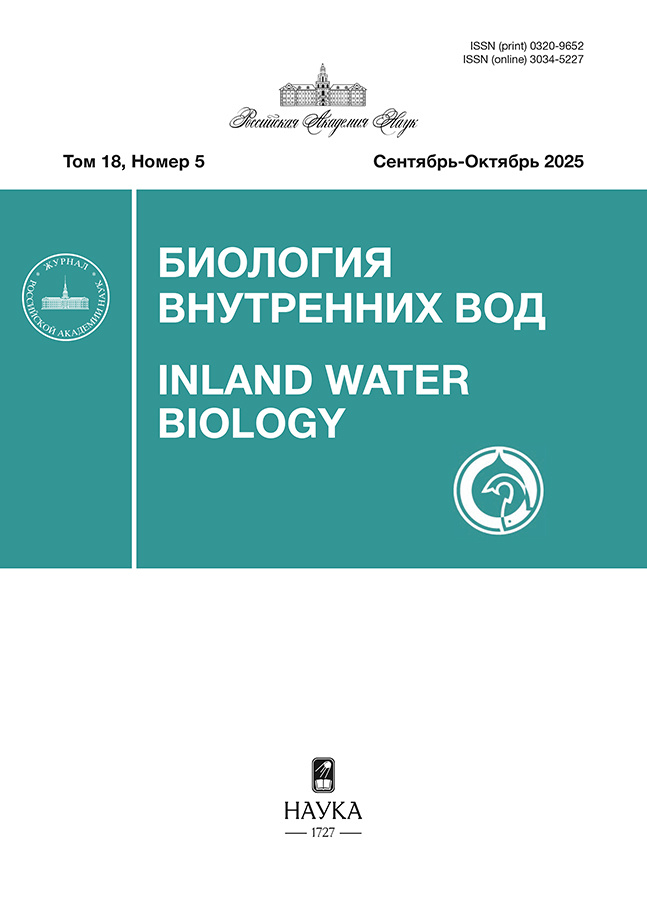Расселение восточно-азиатского вида Thermocyclops taihokuensis (Crustacea, Cyclopoida) в р. Каме (Россия)
- Авторы: Лазарева В.И.1
-
Учреждения:
- Институт биологии внутренних вод им. И.Д. Папанина Российской академии наук
- Выпуск: Том 18, № 1 (2025)
- Страницы: 109–112
- Раздел: CТРУКТУРА И ФУНКЦИОНИРОВАНИЕ ВОДНЫХ ЭКОСИСТЕМ
- URL: https://ter-arkhiv.ru/0320-9652/article/view/679325
- DOI: https://doi.org/10.31857/S0320965225010098
- EDN: https://elibrary.ru/CFANAP
- ID: 679325
Цитировать
Полный текст
Аннотация
По материалам сборов в августе 2018–2023 гг. изучен состав копепод р. Камы в пределах Волго-Камского и Камского плесов Куйбышевского водохранилища, а также Нижнекамского и Воткинского водохранилищ. Установлено, что восточно-азиатский вид Tеrmocyclops taihokuensis (Harada, 1931) впервые появился в устье р. Камы в 2018 г., к 2023 г. он заселил Волго-Камский плес. В 2022 г. вселенец впервые зарегистрирован на нижнем участке Камского плеса Куйбышевского водохранилища и в Нижнекамском водохранилище. Северная граница распространения вселенца расположена вблизи устья р. Белая (56° с.ш.) в 320 км от слияния рек Камы и Волги.
Ключевые слова
Полный текст
Об авторах
В. И. Лазарева
Институт биологии внутренних вод им. И.Д. Папанина Российской академии наук
Автор, ответственный за переписку.
Email: lazareva_v57@mail.ru
Россия, пос. Борок, Некоузский р-н, Ярославская область
Список литературы
- Алексеев В.Р. 2015. Надотряд веслоногие раки – Copepoda // Определитель рыб и беспозвоночных Каспийского моря. Т. 2. Стрекающие, гребневики, многощетинковые черви, веслоногие ракообразные и мизиды. СПб.: Тов-во науч. изданий КМК. С. 39.
- Дзюбан Н.А. 1960. О районировании Куйбышевского водохранилища // Бюл. Ин-та биологии водохранилищ. № 8–9. С. 53.
- Гвоздарева М.А., Мельникова А.В. 2021. Современное распределение инвазионных видов зоопланктона и зообентоса в Куйбышевском водохранилище // Матер. IX науч.-практ. конф. молодых ученых с международным участием “Современные проблемы и перспективы развития рыбохозяйственного комплекса”, посвященной 140-летию Всерос. науч.-исслед. ин-та рыб. хоз-ва и океаногр. (ВНИРО). М.: Изд-во ВНИРО. С. 47.
- Лазарева В.И. 2020. Многолетние изменения состава и обилия зоопланктона водохранилищ р. Камы // Биология внутр. вод. № 3. С. 260. https://doi.org/10.31857/S0320965220030110
- Лазарева В.И., Жданова С.М., Сабитова Р.З. 2022. Расселение восточноазиатской копеподы Thermocyclops taihokuensis (Harada, 1931) (Crustacea, Cyclopoida) в бассейне реки Волги // Биология внутр. вод. № 2. С. 147. https://doi.org/10.31857/S0320965222010065
- Нечаев Д.Ю. 2016. Фаунистическое разнообразие планктонных беспозвоночных Волго-Ахтубинской поймы // Матер. Всерос. молодежной гидробиол. конф. “Перспективы и проблемы современной гидробиологии”, пос. Борок, Ин-т биологии внутренних вод им. И.Д. Папанина РАН, 10–13 ноября 2016 г. Ярославль: Филигрань. С. 117.
- Рылов В.М. 1948. Фауна СССР. Ракообразные. Cyclopoida пресных вод. Т. 3. Вып. 3. М.: АН СССР.
- Сидоровский С.А., Каргапольцева И.А., Холмогорова Н.В. 2018. Каталог ракообразных (Arthropoda, Crustacea) республики Удмуртия // Амур. зоол. журн. Т. 10. № 2. С. 101.
- Шарапова Л.И. 2014. Зоопланктон Северо-Восточного Каспия. Приложение 2 // Мониторинг окружающей природной среды Северо-Восточного Каспия при освоении нефтяных месторождений. Алматы: АджипККО. С. 228.
- Guo X. 1999. The genus Thermocyclops Kiefer, 1927 (Copepoda: Cyclopidae) in China // Hydrobiologia. V. 403. P. 87.
- Mirabdullayev I.M., Reid J.W., Ueda H. 2003. Genus Thermocyclops Kiefer, 1927 // Copepoda: Cyclopoida genera Mesocyclops and Thermocyclops. Guides to the Identification of the Microinvertebrates of the Continental Waters of the World 20. Leiden: Backhuys Publ. P. 214.
- Monchenko V.I. 2008. Redescription of the Oriental Thermocyclops taihokuensis (Harada, 1931) (Copepoda: Cyclopoida) from its westernmost population // Zoology in the Middle East. V. 43. № 1. Р. 99. https://doi.org/10.1080/09397140.2008.10638274
- Zhikharev V., Gavrilko D., Kudrin I. et al. 2023. Structural organization of zooplankton communities in different types of river mouth areas // Diversity. V. 15. 199. https://doi.org/10.3390/d15020199
Дополнительные файлы












